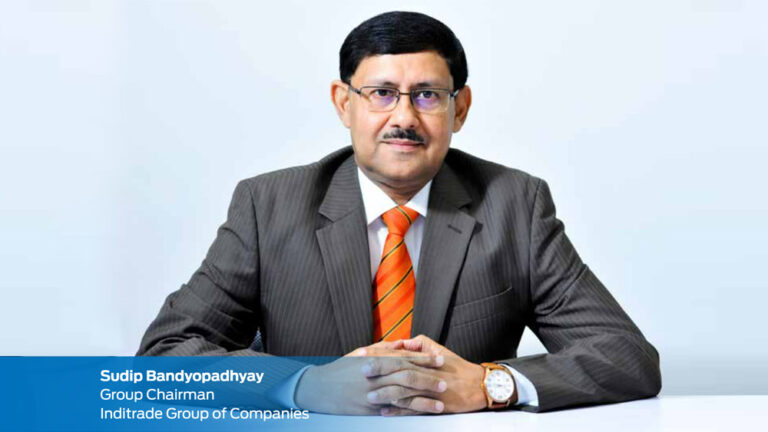Sudip Bandyopadhyay is Group Chairman at Inditrade Group of Companies. A Chartered Accountant and Cost Accountant with more than three decades of experience in various areas of finance and financial services, he has been part of various large conglomerates such as Hindustan Unilever, ITC and Reliance amongst others. During his 16 years stint with ITC as Head of Treasury and Strategic Investments, he managed investments in excess of $1.5 billion. Sudip was also responsible for the acquisition of strategic stakes in several other companies, by ITC. At Reliance Anil Dhirubhai Ambani Group he was instrumental in leading its foray, amongst others, into Equity and Commodity Broking, Financial Products Distribution, Commodity Exchanges, Gold Coin Retailing, Money Changing and Money Transfer. Sudip was also responsible for the acquisition of AMP Sanmar through which Reliance launched its Life Insurance business. In his last assignment, Sudip was the Managing Director and CEO of Destimoney, a full service financial organization, promoted by New Silk Route – an Asia focused growth capital private equity firm with over $1.4 billion under management. It is Sudip’s long term vision to ensure Inditrade is an active participant in nation building. He sits on the Boards of a number of listed and unlisted domestic companies and is also an investor in many Fintech and other Technology related ventures. Sudip Bandyopadhyay also has regular presence in electronic and print media.
What is your opinion about the Samvat gone by?
Last Samvat was a great one for the Indian markets for many reasons but one clear emerging trend did manifest and that was very encouraging. On multiple occasions during the year, even recently we had seen continuous selling by FIIs due to risk aversion creeping in on account of global events. Earlier this would have led to major crash in Indian markets with huge selling pressure coming in, on a continuous basis. However, during the Samvat gone by, in spite of bouts of vigorous FII selling, Indian markets did not really crash and we did witness support at every fall and markets turned around very quickly. This was predominantly on account of significant buying by retail, HNIs and domestic institutions. In fact, at present the incremental SIP flows coming to Mutual Fund industry on monthly basis is more than US$ 2 billion. This provides a massive cushion which is why the markets did not sway based on the moods of foreign investors. We expect this trend to continue strengthening and add more muscle to Indian capital markets through regular large domestic inflows.
Key Takeaways
- Global GDP will probably suffer anywhere between 1-1.5% due to the continuation of ongoing conflicts.
- As long as crude don’t start shooting up, there will not be any major negative impact of the conflict.
- The events of last 4 -5 years, have led to wider diversification of assets by investors. They have increased allocation to gold and bonds.
- Few export oriented sectors like IT, Specialty Chemicals etc. may suffer due to global uncertainties and slow-down in global GDP.
- Domestic focused sectors and companies will continue to do well on the back of strong domestic macro-economic fundamentals, post Covid recovery wave and public and private spending on infrastructure and capital goods.
- At present the incremental SIP flows coming to Mutual Fund industry on monthly basis is more than US$ 2 billion, providing a massive cushion which is why the markets did not sway based on the moods of foreign investors
- There are mid and small cap shares which deserves the valuation at which they are now and may continue their upward journey led by QoQ performances.
- Corporate India’s Q2 results have by and large been on the lines predicted.
- We expect FMCG and other consumption stocks to improve performance from Q4 of current fiscal.
- FIIs allocation for India is increasing – Geo-political as well as commercial reasons are making them uncomfortable about investing in China.
- We estimate that public spending as well as private capex cycle will continue well into FY25.
- At every market correction it will be good to pick up good quality stocks.
- Nifty can touch 23000 by next Diwali.
What you feel about the current global tension. It’s at two fronts – Russia-Ukraine and now Israel-Hamas. How much, in your opinion, impact it will have on the stock markets?
Unfortunately, the world is currently witnessing massive geo-political upheavals. Both Russia- Ukraine War as well as Israel-Hamas conflict has changed the global equations and established risk modules. It is extremely difficult to predict the direction and duration of these conflicts. It definitely destabilizes established ways of doing business and creates challenges in the existing supply chains. All these lead to unpredictable vagaries in commodity prices leading to major pressure on corporate profit margins.
These two geo-political upheavals on the back of Covid has created major challenges for the global economy and definitely has negative impact on post Covid economic recovery. Global GDP will probably suffer anywhere between 1-1.5% due to the continuation of above conflicts. An early resolution and no further escalation should be ideal from the global economy point of view.
Stock markets have to an extent discounted these geo-political conflicts at this stage. However, any escalation of the conflicts which may engulf other nations, will lead to a sharp corrections. Even crude oil prices have to an extent stabilized from the shock of Israel Hamas conflict. As far as Indian stock market is concerned, as long as crude don’t start shooting up, there will not be any major negative impact. Few export oriented sectors like IT, Specialty Chemicals etc. may suffer due to global uncertainties and slow-down in global GDP. However, domestic focused sectors and companies will continue to do well on the back of strong domestic macro-economic fundamentals, post Covid recovery wave and public and private spending on infrastructure and capital goods.
Do you think global uncertainty might play a role in investors’ mindset to conserve wealth and stay at safer side?
Global uncertainties certainly play a role in global investors’ mindset and make them risk averse. Bouts of severe risk aversion caused by multiple global factors leads to sell off in emerging market like India. In such situation Investors prefer risk free assets like US Treasury Bonds as opposed to risky emerging market equities. Gold also becomes attractive in these circumstances. However, currently we are witnessing participation in Indian markets by a diversified set of investors with differentiated risk profiles. The long term investors look beyond these short term volatility and seek normalized returns over a longer period of time. Only the short term investors, many of whom focus on arbitrage and who for obvious reasons are very sensitive to global uncertainties and US Bond price movements.
Undoubtedly, the events of last 4 -5 years, have led to wider diversification of assets by investors. They have increased allocation to gold and bonds. However, with quantitative easing continuing unabated in the developed economies till recently, the incremental liquidity in the hands of investors have been significant. This has led to even allocation for equity increasing in absolute terms.
“All long term investors in Indian equity markets should retain their belief and confidence in the strength of Indian capital markets to provide them better returns. It would be sensible for them to participate in this upward journey by both carefully selecting stocks, and investing in them for long term or participating in this journey through investments in Mutual Funds, may be through the SIP route.”
US Treasury bond yield has crashed from 5 to 4.6 per cent within a week. In this scenario what could be the Fed’s next action. Do you think rate hike rounds are over or still some space left for it?
It is true that there has been a sharp fluctuations in US Treasury Bond yields in the recent past. Predominately the market ran way ahead of Fed and post Fed announcement of the last policy, the markets corrected and the yields came down. The economic indicators coming out of regularly in US point out to the fact that US is most probably headed towards a soft landing. In such a scenario Fed may not be required to do any further tightening. However, we believe that US Fed will be cautious and will not be in a hurry to reduce the rates in US.
Do you find at present Mid & Small-caps are placed better to create higher wealth in FY24?
As far as Indian markets are concerned, mid and small caps have undoubtedly created higher wealth in FY24. However, the dream run may not continue and we believe that large cap will also catch up soon and the next rally may be large cap driven. Even after correction which happened in mid and small cap in the recent past, there is still some froth in different pockets. While it is incorrect to paint the entire mid and small cap universe with the same brush, the massive rally took up the entire mid and small cap universe. Now when logic returned, men are getting separated from boys. There are mid and small cap shares which deserves the valuation at which they are now and may continue their upward journey led by QoQ performances. On the other hand, many large cap stocks do look relatively cheaper and deserve re-rating.
What do you make of the quarterly results? And what is your take on the current valuations?
Corporate India’s Q2 results have by and large been on the lines predicted. As expected, IT has under-performed, domestic focused sectors like Cement, Construction, Infrastructure, Building materials etc. have out-performed. We believe that this trend will continue for at least couple of more quarters. We are witnessing large public spending as well as private capex pick up. This has led to massive order pipeline for companies in the capital goods manufacturing, construction, infrastructure and all related supplier industries. Similarly, Defence – Make in India has led to massive bounce in defence stocks. On the other hand, significant restructuring and upgrading in rail infrastructure has enthused the related stocks. There are multiple such pockets of domestic economy facing sectors which are doing well and also are expected to continue doing well. We estimate that public spending as well as private capex cycle will continue well into FY25. The valuations of some of the companies may look stretched. However, a bit of time correction is possible considering that performances continue to be robust and overall macro factors remains conducive.
Which theme and emerging sectors will create wealth for investors in FY24?
Sectors which will create wealth for investors in the New Samvat are likely to be CONSTRUCTION, INFRASTRUCTURE and CAPITAL GOODS related. We strongly believe that multiple opportunities exist in building materials, cement, pipe, wires etc. Rural demand has been subdued which has led to bit of stagnation for the FMCG companies. It is expected that the increased government spending and new crop arrival should rekindle rural demand and facilitate demand recovery for a whole host of consumption stocks. Thus, we expect FMCG and other consumption stocks to improve performance from Q4 of current fiscal.
Do you think FIIs have lost their previously held significance/ influence on the Indian stock market?
It is incorrect to assume that FIIs lost influence on the Indian stock markets. It is true that domestic investors are becoming strong but the fact remains that FIIs do play an important role in the Indian Capital Markets. With Indian economy becoming strong, FIIs allocation for India is also increasing. Geo-political as well as commercial reasons are also making them uncomfortable about investing in China, which leads to increase of allocation for India. Thus, if Indian economy continues its growth trajectory and the geo-political situation remain conducive, FIIs allocation for India will significantly increase and that will enable Indian corporate and capital markets to better serve the purpose of nation building.
Where do you see Sensex and Nifty by the next Diwali?
Assuming continuation of Indian economic growth trajectory and stabilize geo-political environment, Nifty can touch 23000 by next Diwali.
What advise you’ll give to our readers?
All long term investors in Indian equity markets should retain their belief and confidence in the strength of Indian capital markets to provide them better returns. It would be sensible for them to participate in this upward journey by both carefully selecting stocks, and investing in them for long term or participating in this journey through investments in Mutual Funds, may be through the SIP route. Undoubtedly, at every market correction it will be good to pick up good quality stocks for their portfolio. It is extremely important to be in the market for a time and not try to time the market.






















